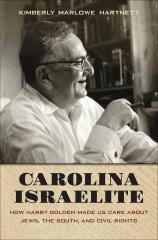Carolina Israelite: How Harry Golden Made Us Care about Jews, the South, and Civil Rights
Review
Carolina Israelite: How Harry Golden Made Us Care about Jews, the South, and Civil Rights
Born Herschel Goldhirsch in the Ukraine in 1902, Harry Golden grew up in New York City’s Lower East Side and moved to Charlotte, North Carolina, in 1941. There his newspaper, Carolina Israelite, was created full-blown, from the vast intellect of this remarkable man whose new, comprehensive biography reads like a Who’s Who of his heyday.
Charlotte was a burgeoning bourgeois bastion of post-war southern values at the time Golden hit town. He brought with him the yarns and accents of the Lower East Side, deftly using Jewish humor and chutzpah as a wedge to insinuate himself, eventually comfortably, into stuffy Charlotte society. In so doing, it should be said, he created something of a salon amongst liberals in the Queen City. But his ambition, like his girth, was not small and his influence hardly provincial. Veteran journalist Kimberly Marlowe Hartnett grew up on Golden’s writings, if from a distance, and recounts that Golden was an astute businessman who used to send unsolicited subscriptions of Carolina Israelite to prominent Americans. That and other commercial ploys, plus his amusing but incisive observations of the local, national and world scene, garnered him a wide readership and the attention of some of his era’s most important players. The plump, hard-drinking, heavy-spectacled character was captured in snapshots with the likes of Carl Sandburg, Sammy Davis Jr., Eleanor Roosevelt, and Bobby and Jack Kennedy.
"Hartnett objectively reveals Golden as a man of great achievement, but whose private life (a stint in prison for fraud, fractured relationships with his wife and children) did not match his public image..."
Golden wrote several book-length collections of Jewish lore, beginning with ONLY IN AMERICA, an immediate bestseller. But perhaps his real niche was carved during the Civil Rights struggle, when he boldly satirized segregation in a way not seen before or since. He suggested that since only black nannies of white children could sit in the downstairs, white section of movie theaters in the Jim Crow South, African American women should carry white baby dolls in to the movies. He postulated that southern whites would tolerate blacks who were standing but not sitting (as at lunch counters or in schools) and so devised what he called “the vertical Negro plan” for desegregation. He got involved, and stayed involved, in landmark civil rights issues until the rise of the Black Power movement, when he and other staunch liberals no longer had a place at the table.
Hartnett notes that Bobby Kennedy and Golden both “loved America in a deep and sentimental way.” Golden and Martin Luther King, Jr. met briefly several times and shared ideals of equality, Golden sagely regarding King as someone who was able to, in Hartnett’s words, “frame the civil rights issue as a morality question understandable to the majority culture.” Hartnett objectively reveals Golden as a man of great achievement, but whose private life (a stint in prison for fraud, fractured relationships with his wife and children) did not match his public image, and whose fame has inevitably faded as the lens of history has framed new cultural icons to fit new eras.
Still, Hartnett says, Harry Golden can be seen as a significant societal symbol: a humorist, a troublemaker, he had the soul of a blogger without the accompanying technology. She describes him as “a blatant self-promoter,” “a cool pragmatist,” “a sharp political handicapper” and “a success, by all manner of measures.” Perhaps, fairly, he will be most kindly remembered as “a Jew who believed that the black Christian clergy would lead America out of his racist past,” and who had the nerve and verve to sell that idea.
Reviewed by Barbara Bamberger Scott on September 18, 2015
Carolina Israelite: How Harry Golden Made Us Care about Jews, the South, and Civil Rights
- Publication Date: May 11, 2015
- Genres: Biography, Nonfiction
- Hardcover: 368 pages
- Publisher: University of North Carolina Press
- ISBN-10: 1469621037
- ISBN-13: 9781469621036





